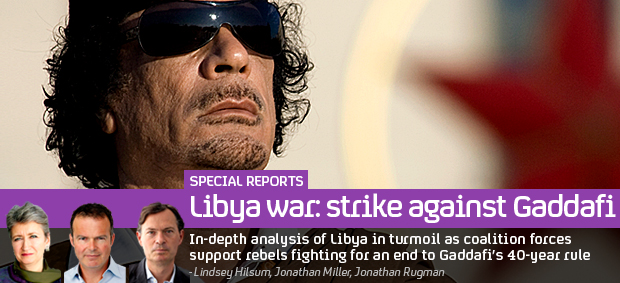Gaddafi to go claim ‘wishful thinking’
French claims that Colonel Gaddafi is ready to step down are just internal political posturing says defence analyst Anthony Tucker-Jones.

As France’s Parliament debated continuing support for the Nato air campaign in Libya on Tuesday, the French Foreign Minister Alain Juppé stated that Gaddafi is now prepared to leave. This may be wishful thinking.
Some might argue that he was saying exactly what the French parliament needed to hear, as it has to approve the continuation of any military operations lasting longer than four months.
Juppé’s statement – and the comments of Defence Minister Gérard Longuet that it was time to “get round the table” with Gaddafi’s regime are clearly designed to bolster French resolve.
Despite claims by one of Gaddafi’s sons – Saif al-Islam – that a special envoy has met President Sarkozy, Juppé tried to play down any divisions within Nato and denied any direct negotiations.
The rebel National Transitional Council, American, Britain and France remain united that Gaddafi has to go before there can be any talks.
The reality is that the rebels do not have the military resources to oust Gaddafi.
The Libyan Prime Minister, Baghdadi al-Mahmoudi, has said Tripoli will negotiate but only once the bombing stops.
The reality is that the rebels do not have the military resources to oust Gaddafi and remain reliant on the Nato air campaign to “protect” civilians.
It is unclear whether such offers for Gaddafi to stand down are genuine or simply playing for time while his supporters counter recent rebel gains.
Following the rebels’ successful drive toward Gharyan just 60 miles south west of Tripoli last week, loyalists moved to counter this by sending in one of Gaddafi’s few really effective army units – the 32nd Brigade better known as the Khamis Brigade.
Gaddafi’s troops are attacking toward Wazin – the only rebel-held border crossing with Tunisia. They are also striking toward Nalut a nearby Berber mountain town.
Although Wazin is 120 miles behind the frontline it provides a vital lifeline to the rebel forces aiming to take Gharyan, which dominates Libya’s strategically important north-south highway.
The rebels’ next push will be to secure the village of As Sabha on the outskirts of Gharyan. Loyalist resistance here will provide a litmus test for how fiercely they are prepared to defend Gharyan itself.
If Gaddafi’s forces capture Nalut and Wazin this will choke off supplies to the rebels and cut them off in the Western Nafusa Mountains.
Rocket attacks
Over the weekend, the Libyan government conducted retaliatory artillery and rocket attacks on Nalut and Wazin sending the local residents and opposition fighters scattering for cover. Reports indicate that Libyan shells have been falling on Tunisian soil.
If Gaddafi’s counter-attack succeeds then this will bottle up the rebel Tripoli Battalion, which according to intelligence sources is being trained in the Nafusa Mountains ready to secure the city when it falls into rebel hands.
The Tripoli Battalion is intended to help allay fears that the rebels will prove incapable of controlling the Libyan capital. The battalion has recruited volunteers from Tripoli as well as educated Libyan expats whose job will be to safeguard the capital’s infrastructure.
The rebel advance has already been slowed west of Misrata, if the rebels stumble before As Sabha then the initiative will pass back to Gaddafi’s forces. Gaddafi and his generals know that they cannot sit back while the rebels slowly but surely encroach on Tripoli.
Opposition forces are now just six miles from Gharyan and are waiting on intelligence from the inhabitants of As Sabha before pushing forward.
Gaddafi is gambling that his offers to negotiate and/or threats of terrorist attacks across Europe will cause some slackening in the Nato air campaign – any weakening of this will give him exactly the window of opportunity that he needs to cling on.
Anthony Tucker-Jones is a former intelligence analyst and now writes as a correspondent for ‘intersec – The Journal of International Security’ and defencemanagement.com
